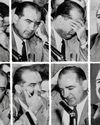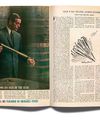
When Alan Hollinghurst published his scandalizing début, “The Swimming-Pool Library,” in 1988, the lives of gay men were hardly virgin territory for the English novel. Some years earlier, as a graduate student at Oxford, Hollinghurst had written a master’s thesis on “the creative uses of homosexuality” in three of his more guarded forebears—E. M. Forster, Ronald Firbank, and L. P. Hartley—though there the emphasis, naturally enough, fell on “the stimulating effects of constraint.” “The Swimming-Pool Library,” by contrast, was a work of revolutionary candor that laid bare, in exquisite prose, the cut and thrust of queer existence in early-eighties London. Its attitude toward the euphemistic delicacy of a previous era is nicely encapsulated in a moment from a novel that Hollinghurst came out with three decades later, “The Sparsholt Affair,” when a character spots on an acquaintance’s wall “a red chalk drawing of a naked man, with a body-builder’s chest and ridged stomach, artily cut off at the knee and the neck, and with a highminded blur where the cock and balls should be.” A high-minded blur will never do for Hollinghurst, the great depixelator of carnal truths.
Bu hikaye The New Yorker dergisinin September 30, 2024 sayısından alınmıştır.
Start your 7-day Magzter GOLD free trial to access thousands of curated premium stories, and 9,000+ magazines and newspapers.
Already a subscriber ? Giriş Yap
Bu hikaye The New Yorker dergisinin September 30, 2024 sayısından alınmıştır.
Start your 7-day Magzter GOLD free trial to access thousands of curated premium stories, and 9,000+ magazines and newspapers.
Already a subscriber? Giriş Yap
Techniques and cIdiosyncrasies

FEAR FACTOR
How the Red Scare reshaped American politics.

PLAYTIME
The old film studios had house styles: M-G-M’s was plush and sentimental, Warner Bros.’ stark and intense.

TIME AND PLACE
“Tatlin: Kyiv” explores a Russian Constructivist’s Ukrainian identity.

MOURNING BECOMES HER
Akram Khan’s “Gigenis: The Generation of the Earth.”

TEXAS ROUNDUP
How Greg Abbott made his state the staging ground for Donald Trump's mass-deportation campaign.

HOUSE CALL
To rent or to buy is the eternal question.

INDESCRIBABLE
The human disaster of the Irish famine.

Louisa Thomas on John Updike's "Hub Fans Bid Kid Adieu"
The original idea was an assignation. On a dreary Wednesday in September, 1960, John Updike, \"falling in love, away from marriage,\" took a taxi to see his paramour.

LIP SERVICE
Zyn and the new nicotine gold rush.